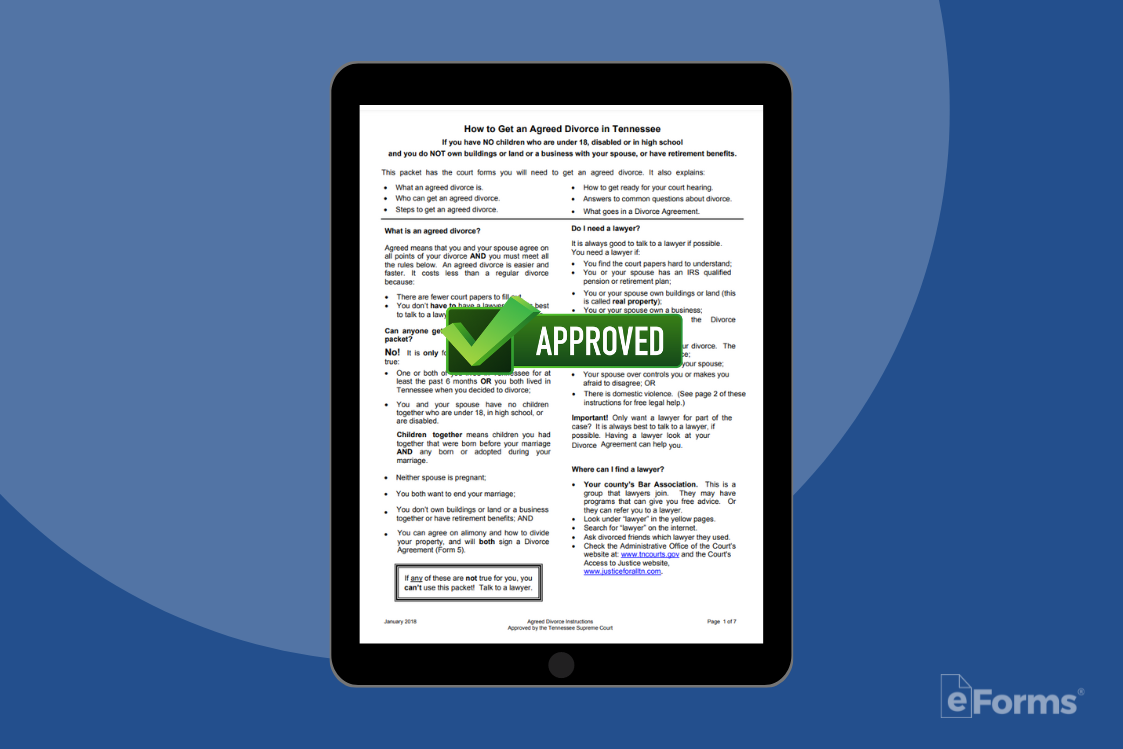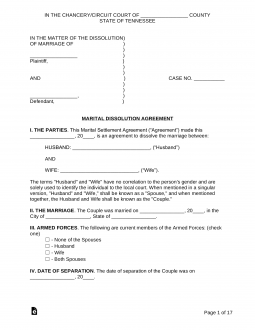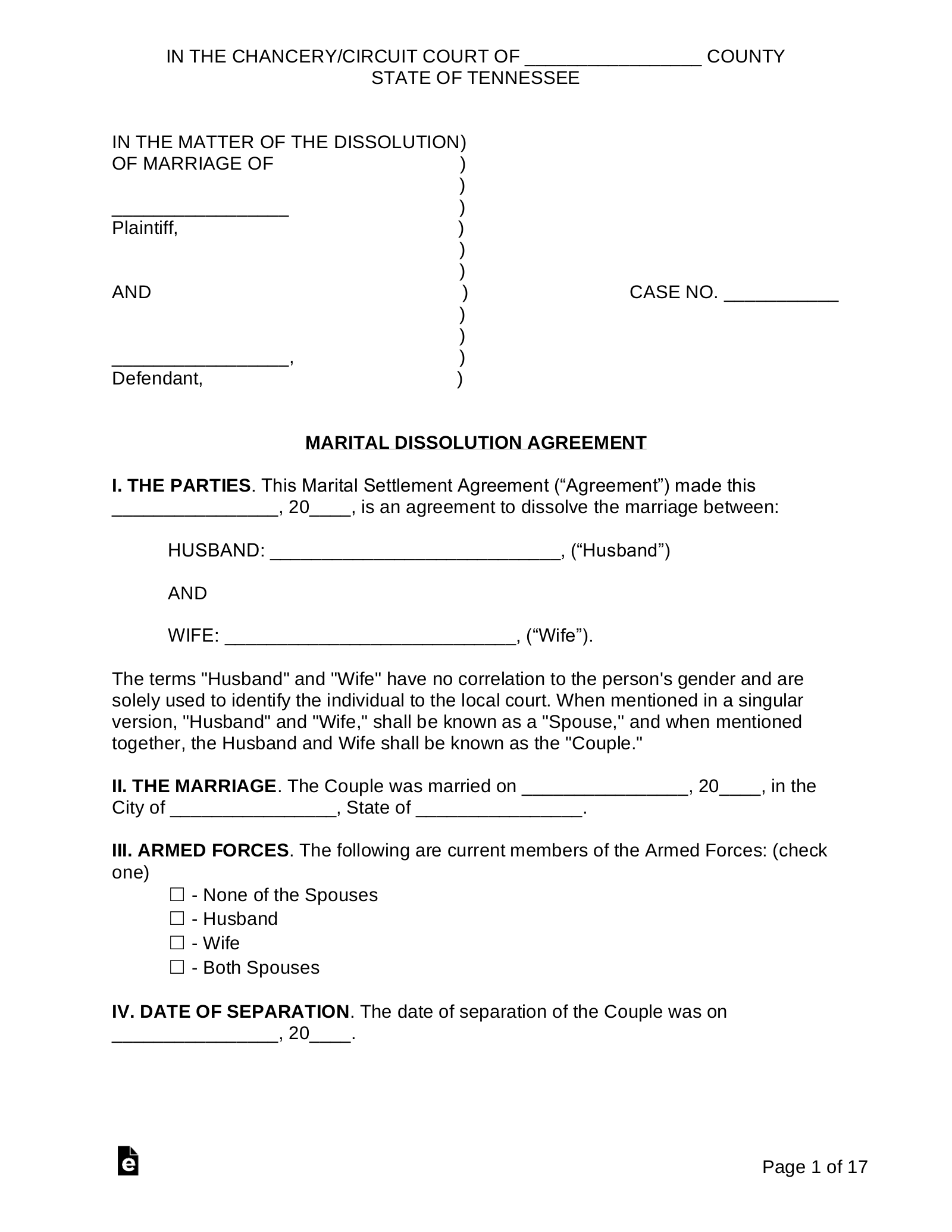Updated November 03, 2023
A Tennessee marital settlement agreement is a legal instrument used by spouses to establish the terms and conditions of the dissolution of their marriage. Issues like alimony, child support and custody, property division, and debt distribution are covered in the document to ensure both spouses maintain a standard of living post-divorce that is comparable to the standard during their marriage. A settlement agreement can be drawn up by the spouses alone or they can hire a legal professional to help them sort out whatever matters they cannot agree to on their own. This agreement can be completed at any point during the spouses’ separation, and it institutes a mutually beneficial arrangement for themselves and, if applicable, their children. However, in divorce proceedings, specifically agreed (uncontested) divorces, a marital settlement agreement is included in the divorce forms, and it must be completed by the spouses and filed at the appropriate time in order to obtain an official divorce order from a judge.
Table of Contents |
Divorce Laws
Statutes – Title 36, Chapter 4 (Divorce and Annulment) and Chapter 5 (Alimony and Child Support)
Alimony (§ 36-5-121) – In Tennessee, a judge may award rehabilitative alimony, periodic alimony, transitional alimony, lump sum alimony, or a combination of these to the less economically stable spouse. When determining the amount and appropriateness of alimony payments that one spouse must pay to the other, the court will consider the following factors:
- Relative earning capacity, obligations, needs, and financial resources of the parties
- Relative education and training of the parties as well as the ability and opportunity to secure education and training to improve earning capacity
- Duration of the marriage
- Age and mental condition of the parties
- Physical condition of the parties
- Inability to seek employment due to primary custodial duties of a minor child of the marriage
- Separate assets, both real and personal, of the parties
- Provisions made with regard to the marital property
- Standard of living established during the marriage
- Tangible and intangible contributions, monetary or homemaker, made by the parties
- Relative fault of the parties
- Tax consequences
Alimony Calculator – calculators.law
Child Support (§ 36-5-101) – The determination of child support will be made by calculating all income sources of both parents and using the Schedule of Basic Child Support Obligations set forth in the Child Support Guidelines, Chapter 1240-2-4-.09 of the Rules of the Tennessee Department of Human Services.
Child Support Calculator – Tennessee Department of Human Services
Division of Property (§ 36-4-121) – All marital property, i.e., property acquired by either or both spouses during the course of the marriage, shall be divided equitably between the parties, without regard to marital fault. Equitable distribution means dividing the property fairly between the spouses as opposed to evenly in a fifty-fifty split.
Grounds for Divorce (§ 36-4-101) – In Tennessee, a person can divorce their spouse for any of the following reasons:
- Impotent and incapable of procreation
- Already married
- Adultery
- Willful/malicious desertion for one (1) year or more
- Convicted of a crime that renders them infamous
- Convicted of a felony and sentenced to prison
- Malicious attempt on the other spouse’s life
- Refusal to live in Tennessee with their spouse without reasonable cause and being absent therefrom for two (2) years or more
- Pregnant by another party at the time of the marriage
- Habitual drunkenness, including narcotic drugs, when the abusing party contracted the habit after marriage
- Cruel and inhuman treatment or conduct rendering cohabitation unsafe and improper
- Indignities from one party to the other, rendering their position intolerable and causing them to withdraw
- Abandoning or forcing their spouse to leave and refusing to provide for them when they have the ability to do so
- Irreconcilable differences
- Living separately and apart for a continuous period of two (2) years or more and there are no minor children of the marriage
Interim Support (§ 36-5-121(b)) – At any point during the proceedings of a divorce or legal separation, the court may order one spouse to support the other financially so they may properly prosecute or defend the action.
Residency (§ 34-4-104) – To file a divorce action in the state of Tennessee, the plaintiff (spouse filing the complaint) must have resided in the state when the action that caused the divorce (see grounds for divorce) occurred in the state. If the action that caused the divorce was not committed in the state, either the plaintiff or defendant must have resided in the state for six (6) months preceding the filing of the complaint.
Separation (§ 36-4-101(a)(15)) – There is no separate cohabitation requirement for spouses who wish to get divorce or legally separated. However, if a spouse wishes to file for divorce based on the fact that the parties have been living separately and apart, they must have lived in separate residences for at least two (2) years and have no minor children.
Divorce Forms
- Where to File – Circuit Court / Chancery Court
- Filing Fee – Varies by county, ~$200 – $400
- How Long Does it Take? Ninety (90) days (minimum)
Uncontested Divorce with No Children:
- Divorce Packet No Children – includes:
- Request for Divorce
- Spouses’ Personal Information
- Request to Postpone Filing Fees (if applicable)
- Health Insurance Notice
- Divorce Agreement
- Final Decree of Divorce
- Restraining Order
- Notice of Hearing
- Divorce Certificate (provided by court clerk – see Step 2)
Uncontested Divorce With Children:
- Divorce Packet With Children – includes:
- Request for Divorce
- Spouses’ Personal Information
- Request to Postpone Filing Fees (if applicable)
- Health Insurance Notice
- Divorce Agreement
- Final Decree of Divorce
- Restraining Order
- Notice of Hearing
- Title IV-D Information Form (only if one or both parents receive benefits from the state for child support)
- Parenting Plan Order
- Child Support Worksheet
- Divorce Certificate (provided by court clerk – see Step 2)
How to File for Divorce in Tennessee (6 steps)
1. No-Fault
2. Request for Divorce
 To commence a divorce action, the spouses must complete and file the appropriate documents with the court clerk in their county. All relevant agreed divorce forms are provided in the Divorce Packet No Children and Divorce Packet With Children. Although some of the documents require both spouses’ information and signatures, only one (1) spouse needs to file the paperwork. The spouse who files the paperwork is referred to as the “plaintiff” and the other spouse the “defendant,” simply for clerical purposes during the proceedings. The following documents from the appropriate divorce packet must be downloaded and completed first:
To commence a divorce action, the spouses must complete and file the appropriate documents with the court clerk in their county. All relevant agreed divorce forms are provided in the Divorce Packet No Children and Divorce Packet With Children. Although some of the documents require both spouses’ information and signatures, only one (1) spouse needs to file the paperwork. The spouse who files the paperwork is referred to as the “plaintiff” and the other spouse the “defendant,” simply for clerical purposes during the proceedings. The following documents from the appropriate divorce packet must be downloaded and completed first:
- Request for Divorce (Form 1) (requires notarization)
- Spouses’ Personal Information (Form 2)
- Request to Postpone Filing Fees (Form 3) (only applies if the spouses cannot afford the filing fees)
- Health Insurance Notice (Form 4)
- Title IV-D Information Form (only if one or both parents receive benefits from the state for child support)
These forms must be taken to the circuit or chancery court clerk in the county where the defendant lives or the county where the plaintiff and defendant lived when they separated. However, if the defendant lives out-of-state, the plaintiff may file in the county where they reside. The plaintiff should ask the clerk if they require a Civil Case Cover Sheet in this county. If they do, the clerk will provide this document and the plaintiff will need to fill it out. A fee will be charged for filing the initial divorce forms. The filing fee varies by county, but is typically between $200 and $400. The plaintiff should also ask the clerk for a Divorce Certificate; this certificate is not available online and it will need to be filed at a later time.
3. Divorce Agreement
 Spouses filing an agreed divorce action must complete the Divorce Agreement (Form 5 of the appropriate divorce forms packet). This document will cover all the issues that will come into play after the spouses are divorced. A Divorce Agreement covers the distribution of personal property, assets, and debts, as well as alimony payments. Furthermore, either spouse has the opportunity to change their name at this point in the divorce proceedings by completing the appropriate section of the document (‘With Children’ top of page 8, ‘No Children’ bottom of page 7). If there are minor children of the marriage, the spouses must also complete a Parenting Plan Order and a Child Support Worksheet. These documents will detail child support payments, custody information, and visitation rights.
Spouses filing an agreed divorce action must complete the Divorce Agreement (Form 5 of the appropriate divorce forms packet). This document will cover all the issues that will come into play after the spouses are divorced. A Divorce Agreement covers the distribution of personal property, assets, and debts, as well as alimony payments. Furthermore, either spouse has the opportunity to change their name at this point in the divorce proceedings by completing the appropriate section of the document (‘With Children’ top of page 8, ‘No Children’ bottom of page 7). If there are minor children of the marriage, the spouses must also complete a Parenting Plan Order and a Child Support Worksheet. These documents will detail child support payments, custody information, and visitation rights.
4. Additional Forms
 Once the Divorce Agreement has been completed (and Parenting Plan and Child Support Worksheet if applicable), the spouses must complete and sign the following forms:
Once the Divorce Agreement has been completed (and Parenting Plan and Child Support Worksheet if applicable), the spouses must complete and sign the following forms:
- Final Decree of Divorce (Form 6)
- Restraining Order (Form 7)
- Divorce Certificate
These forms, along with the Divorce Agreement and, if applicable, the Parenting Plan Order and Child Support Worksheet, must be filed with the clerk.


